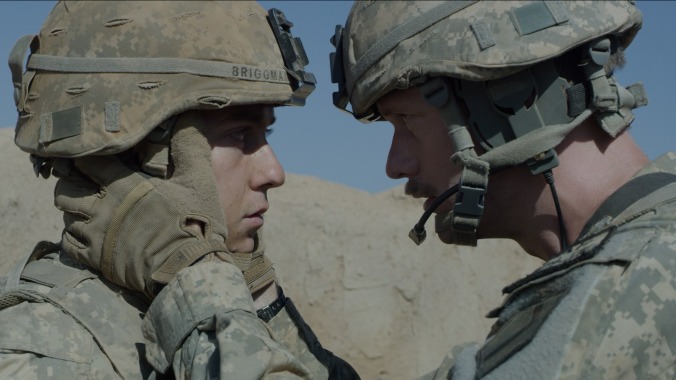News broke this week that the U.S. military is quietly reducing its troop count in Afghanistan, with plans to remove thousands of soldiers after 18 years of war and without a firm peace agreement with the country’s Taliban insurgency. As other conflicts around the Middle East (with Iraq, Syria, and the Islamic State group) have generated increasing media attention, the ongoing war in Afghanistan has shifted out of public awareness. The Kill Team serves as a strong reminder of the violence of that first war declared after September 11, 2001. But its depiction of toxic masculinity and bloodthirstiness within the U.S. Army is blunted by an overly passive lead performance and a lack of specificity in its storytelling.
Writer-director Dan Krauss previously tackled this subject with a 2013 documentary of the same title, which took a close look at the Maywand District murders. He’s changed the names throughout, beginning with real-life Private Adam Winfield, fictionalized here as Andrew Briggman (Nat Wolff). We meet Briggman in the States, miming threats against imaginary Afghans, his skateboard deck playing the part of a gun. What are his reasons for joining the army? His father worked a desk job in the U.S. Marines, and he mentions wanting that “chance.” Otherwise, his motives remain opaque.
Briggman’s reserved personality stands in stark contrast to that of his new comrades: the tattooed Coombs (Jonathan Whitesell), who brags about being labeled a problem child by his teachers; Weppler (Osy Ikhile), who delights at the opportunity to carry around a gun and smoke hashish; Marquez (Brian Marc), who bristles at the casual racism of his fellow soldiers but joins them in mocking Briggman; and Rayburn (Adam Long), who radiates an aura of quiet menace. They call the Afghans “goat fuckers,” laugh about the idea of capturing hearts and minds, and simmer with a competitiveness and rage Briggman mostly can’t match.
Division in the infantry team is intensified when it falls under the command of Staff Sergeant Deeks (Alexander Skarsgård), who thoroughly fits the profile of what an authoritative American soldier should be. Krauss consistently frames Deeks alone, in a white undershirt and dark aviators, no other men infringing upon his solitude. Aesthetically, he’s what the young men aspire to look like: tall, broad, muscular, with tattoos to symbolize the men he’s killed in Iraq and Afghanistan. (Once the rows of skulls along Deeks’ shins are revealed in the weight room, Coombs longingly speaks about getting more ink.) Reveling in his power and the automatic respect it confers, he encourages his charges to fight each other to establish dominance, and bribes them with steaks and porn. Murdering civilians is just part of the job. “We kill people. That’s what we do. Do you have a problem with that?” Deeks asks Briggman, and The Kill Team explores the myriad ways the grunt struggles to answer the question.
Krauss communicates the tedious rhythm of serving abroad in an alien-seeming war zone by bouncing back and forth between the barracks—where the soldiers waste time, disparage the Afghans, and feed off each other’s boredom—and dusty, isolated villages that never seem especially threatening. That is, until gunfire rings out or a bomb goes off, and the team takes that as proof that the locals are meant to be subjugated and slaughtered. Through Briggman, The Kill Team wants to provoke empathy for both sides—the young minds being warped by Deeks, and the Afghans affronted by the U.S. Army’s invasion—but Wolff plays the character too much like a blank slate. His status as an outsider is repetitively communicated through his dazed stare; welcome but brief are the scenes that afford Wolff some paranoia and self-assurance to play. And The Kill Team relies too often on Briggman’s reactions to demonstrate the pain and confusion of the Afghans: Their dialogue isn’t subtitled, and the sound drops out during scenes of families grieving for their murdered relatives. They remain others, just as Briggman and his fellow soldiers see them.
An absence of details dampens The Kill Team’s discomforting power. Character motivations are skimpy, and it remains unclear how long these men have been stationed together, which undermines the significance of the fracture that opens up between Briggman and the rest of his unit. Skarsgård is a fantastically seductive villain, all intimidating whispers and masculine bravado. But the movie tiptoes back from exploring how much Deeks’ behavior is encouraged by the guiding mind-set of the American military. Was his burn-it-down approach the rule, not the exception, of U.S. engagement in Afghanistan? The movie resists going deeper on the subject, and ends up feeling anticlimactic. As part of a tide of current films about the missteps in the War On Terror—including Official Secrets and the upcoming The Report—The Kill Team paints a portrait of American exceptionalism. But it never quite shocks or awes.


